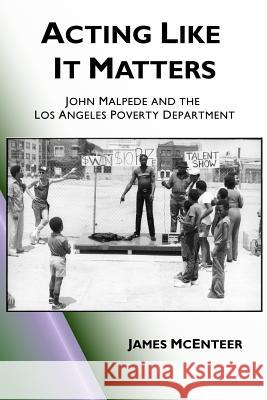Acting Like It Matters: John Malpede and the Los Angeles Poverty Department » książka
Acting Like It Matters: John Malpede and the Los Angeles Poverty Department
ISBN-13: 9781507504239 / Angielski / Miękka / 2015 / 266 str.
For thirty years John Malpede and the Los Angeles Poverty Department (LAPD), have created electrifying political theater by confounding audience expectations. Made up largely of homeless and formerly homeless men and women from L.A.'s Skid Row, LAPD has evolved from staging "happenings" on street corners and in shelters to taking complex ensemble pieces to cities across the United States, Europe and Latin America. Instead of creating illusions, the LAPD strips them away. LAPD actors know first-hand about poverty, addiction, crime, homelessness, class prejudice and the political hypocrisy that sustains them. Life on the street leaves no room for irony. LAPD members, voiceless most of their lives, now given a voice and an audience, cut straight to the heart of the American social and economic dilemmas. No time for bull, just "the real deal." LAPD performers are no longer merely messengers from Skid Row, adding a dose of street-level reality to the national perception of homelessness. They have become advocates for a larger understanding of how poverty, addiction and social deprivation are intimately connected to international violence and globalized greed. Pieces to this puzzle like all around us, but politicians and most media refuse to fit them together. The homeless and formerly homeless addicts and ex-addicts of Skid Row Los Angeles have nothing to lose by telling the truth. Disenfranchised, they are also uninhibited. Acting Like It Matters, tells how John Malpede came to organize a successful theater group on Skid Row. It traces their bumpy, eventful development from 1985 to the present, with a focus on the social and political issues the group raises, sometimes working with other street theater groups from San Francisco to London to Amsterdam to cities in Bolivia. For Malpede, theater is a vehicle, a dramatic way to confront and spotlight important inequities and injustices in our society. My book also focuses on these larger issues. Malpede and the LAPD have returned the theater to its cultural function as envisioned by the Greeks. Ancient classical dramatists thought politics was too important to leave to the politicians. Their plays were topical. Greek audiences expected to confront and consider issues and ideas that were relevant to their daily lives, not wallow in escapism. Even as politicians and corporate media bury news of economic, judicial and racial injustices, Malpede directs the victims of these prejudices - ethnic minorities, ex-addicts and ex-convicts, the lowest-ranking member of our society - to enact their dilemmas for middle-class audiences. Malpede knows that residents of Skid Row, the most vulnerable among us, are the canaries in the coalmine of our culture, harbingers of alienation and futility that now threaten middle-class stability and even survival. Malpede long ago recognized homelessness as a symptom of a society in trouble. He purposely turned his back on personal celebrity and wealth in order to spread this vital message. As noted festival and opera director Peter Sellars said: "John Malpede's work will testify on the side of the angels." Malpede's work is gaining increased recognition. The Queens Musem presented an LAPD retrospective in the winter of 2014, featuring an extensive exhibit and several LAPD performances. In 2013 John Malpede received a Doris Duke Performing Artist Award in recognition of his theatrical achievements.
Zawartość książki może nie spełniać oczekiwań – reklamacje nie obejmują treści, która mogła nie być redakcyjnie ani merytorycznie opracowana.











